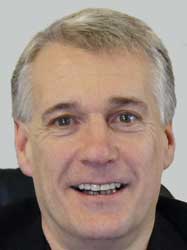
Posted to News on 28th Jan 2013, 10:27
Easy ways to extend the life of machinery
Stuart Harvey of Softstart (UK) discusses ways to reduce mechanical and electrical stresses in motor-driven machinery, and the benefits that accrue from this - including a longer operating life, reduced energy consumption and financial savings.

When I start my morning run, the first step is by far the hardest; the next four or five steps get easier and easier and then I am into my stride - the remaining couple of thousand steps are fine (for a man of my advancing years).
My car is the same. First thing on a cold morning it is not happy, but let the engine warm up and it is as good as gold.
Similar effects apply to industrial machinery too. The stress on start-up is enormous compared to that when things have been running for a while. So if we can find a way to reduce this initial stress we can extend the working life of the machinery and its mechanical and electrical components considerably.
In fact soft starting has been a commonly used technique in some fields of engineering for many years. Typically it is used in high-load applications, such as water distribution pumps, to reduce overload and prevent pressure surges (water hammer), and quarry conveyors to give a smooth ramp-up to speed rather than a load-upsetting jerky start that would cause voltage spikes in the mains. It is also increasingly being applied to smaller machines, including fans, filling pumps, assembly line conveyors and bespoke manufacturing equipment, to reduce shock loads and harmonic distortion in the mains supply.
Soft starting options
Mechanical or electrical devices can be used to provide gentle starting. Common forms of mechanical soft starters include slipping plate clutches and fluid couplings; other types include elastomeric, spring and magnetic couplings, and even shot-filled torque limiters.
However, it is often preferable to implement the soft starting electrically. An electric soft starter temporarily reduces the voltage or current input, allowing the motor to build up to running speed over a specified period of time (typically from a fraction of a second for light production machinery to several tens of seconds for heavy-duty applications).
The effect of temporarily reducing the input is to reduce the load and torque in the motor and its power train during start up. This reduces both mechanical stresses in the drive components and motor, and electrodynamic stresses in the motor and supply cables.
Solid-state soft starters
Small electric soft starters are solid-state devices based on reverse-parallel-connected thyristors, connected in series with the line voltage to control the current applied to each of the three supply phases. Larger soft starters for motors above 25kW are based on series reactors
We can summarise motors starting options as follows:
Direct-on-line starting: This is the simplest way to install a motor, but leads to inrush currents of typically 5-10 times running current and starting toques of 2-5 times running torque. This is acceptable for very small motors and medium-sized motors that are started only very rarely. But, as the stresses caused to the machine, drive and supply are uninhibited, it cannot be used with many applications.
Star-delta starting: This technique requires the installation of a starter between the supply and the motor. The starter uses capacitors to connect the three supply phases into a circuit for the duration of the motor start-up phase, allowing the motor to draw power from all three phases simultaneously. (Because the supply is alternating current, you actually need six capacitors to give forward and reverse circuits.) Once the motor is up to speed, the starter disconnects.
This technique reduces the starting torque considerably. However, the mains supply still peaks and the mechanical stresses can remain high. In addition, the star-delta starters require maintenance due to the effects of the peak loading.
Soft starting: A soft starter continuously varies the three-phase motor's voltage supply during the start-up phase so that the motor steadily adjusts to the machine's load behaviour. Typically the duration of the start-up phase can be adjusted to suit individual applications. The gentle nature of the start-up reduces stress through the system and reduces mains-borne harmonic distortion. Soft starters are generally considered to be maintenance-free items.
It should be noted that electrical supply companies make penalty charges against customers who corrupt the mains supply, so soft starting of motors can have an immediate beneficial financial effect as well as the long-term savings based on reduced plant wear. Furthermore, corrupted mains may adversely affect IT equipment, radios, telephones and other equipment.
Variable-speed drives
Motors are generally fixed-speed output devices (two-speed motors are rare and, within the scope of this discussion, can be considered as equivalent to single-speed units), but they can be fitted with a variable-speed drive or inverter. This also acts as an alternative to a start-delta starter or soft starter to smooth out inrush effects at start up.
Conclusion
We have seen that there are several ways to start a motor, that soft starters are very good at reducing mechanical and electrical stresses during the start-up phase and that they will improve machinery's operating life, control mains corruption and reduce cost of ownership.
With ever-increasing environmental and financial pressures, it is worth considering fitting soft starters to new and existing motor-driven plant.
Follow the link to find out more about the products and services available from Softstart (UK).
Want the latest machine building news straight to your inbox? Become a MachineBuilding member for free today >>

















